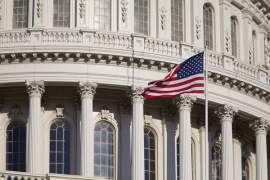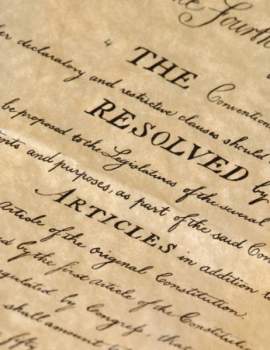
A Full Overview of the Declaration of Independence

Popular In Constitution
Purpose Of Lifetime Appointment And Pros And Cons Enumerated Powers Bicameral Legislature Background Article 3 Of The Constitution We The People 1st Amendment Who Wrote The Constitution Judicial Review Equal Protection Clause 5th Amendment 10th Amendment Three Fifths Compromise
The Declaration of Independence was authored in 1776 by Thomas Jefferson with the help of fellow political leaders, such as John Adams and Benjamin Franklin. Ratified on July 4th, 1776, the Declaration of Independence became the first political doctrine of its kind, advocating for a governing body whose purpose was to serve the citizens that it represented - a contrast to the British monarchy under which the citizens of the United States had been subject prior to the Revolutionary War. Furthermore, the doctrine diagrammed a central government whose power resulted from the consent of its citizens to be governed. The Declaration of Independence established the newly-formed United States of America as a sovereign nation, cutting all ties, both political and gubernatorial, with the British monarchy. The text of the Declaration of Independence not only confirmed the autonomy of the United States of America, but also outlined the various transgressions committed by the British monarchy under King George III. Lack of Governmental Power Thomas Jefferson credited political philosopher John Locke with much of the inspiration for democratic ideology that he had implemented in his authorship of the Declaration of Independence. Thomas Jefferson had been particularly moved by Locke’s notion of a just governing body. Locke stated that every citizen would be entitled to inherent rights and liberties that could not be removed by any governmental body. In addition, Locke stated that the citizens grant their respective government permission to govern them, and as a result, the true power is in the possession of those citizens rather than any governing body. Thomas Jefferson took Locke’s notion a step further by laying the groundwork for a system of checks and balances in which a central government is split into separate factions, thus preventing totalitarian rule. The separate branches of government would be required to work in tandem in order to act. Implications and Image for The Constitution In 1776, the Declaration of Independence was approved by all of the 13 states of the newly-formed United States of America and the implications of the doctrine were apparent. Not only was the United States establishing its sovereignty as an autonomous nation, but the authors of the Declaration of Independence cited what they believed to be fundamental flaws and inefficiencies of the British monarchy under King George III. By doing so, they allowed for a contrast between a totalitarian ruling body operating with absolute power and an elected central government; a government that would be required to act as a public servant protecting the interests and rights of its citizens. In addition, as a sign of diplomatic faith, the Declaration of Independence not only demanded the release of all British prisoners being held captive in the United States, but a return of all British loyalist property unjustly seized subsequent to the end of the Revolutionary War. General Message and Authorship The Declaration of Independence not only illustrated the contempt for totalitarian, monarchical rule on the part of political figureheads such as Thomas Jefferson, John Adams, and Benjamin Franklin, but also elucidated what they considered to be the fundamental flaws of an tyrannical infrastructure that utilized absolute power in order to maintain dominance over its subjects. The Declaration of Independence expresses a clear philosophical message that highlights the incorporation of humanism in the development of the ideal creed to which a democratic central government would adhere. The authors of the Declaration of Independence placed their respective faith and trust in both the ability as well as the judgment of the citizens of the United States, both present and future. By allowing the citizens of the United States the opportunity to not only elect their governing body, but also the opportunity to choose to be governed by that elected body, some political philosophers consider the Declaration of Independence to be a prototype for humanistic political theory.



















